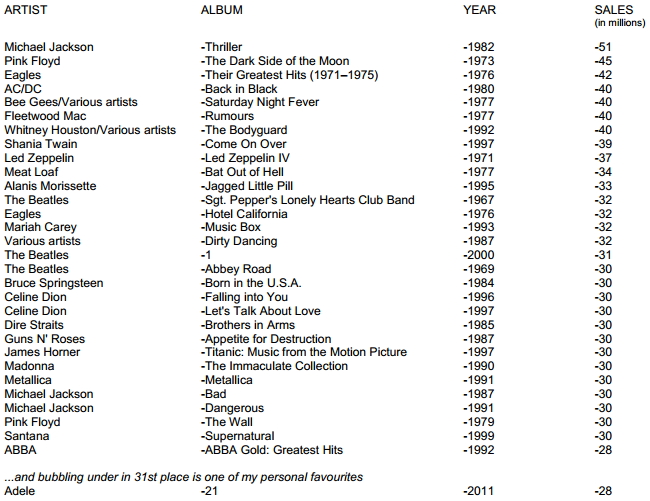The GOATs of Music: Who Really Reigns Supreme?
Who *really* holds the crown for best-selling music artist of all time? It's a question that sparks endless debates, fueled by passionate fans and fuzzy math. Is it the Beatles? Elvis? Or maybe someone totally unexpected? Let's get real, the answer is way more complicated than a simple Google search. Prepare for some serious number crunching and maybe even a few tears shed for forgotten vinyl.
The quest to identify the top-selling music acts is a rabbit hole of certifications, estimated sales, and changing industry standards. Remember those things called "albums"? Yeah, those were a big deal. Now, it's all about streams, downloads, and TikTok virality. So, comparing artists across different eras is like comparing apples and, well, Teslas. It just doesn't work.
But the obsession with crowning music royalty persists. Why? Because these artists, whether they sold millions of LPs or billions of streams, represent something bigger than just catchy tunes. They represent cultural moments, generations defined by sound, and the power of music to connect us all. Think about it: where were *you* when you first heard "Thriller"?
So, let's talk about the usual suspects. The Beatles, with their mop tops and catchy harmonies, have consistently topped many best-selling lists. Then there's Elvis, the King of Rock and Roll, whose hip-shaking swagger still resonates decades later. Garth Brooks, despite a relatively shorter career, has racked up some insane sales numbers. And Madonna, the Queen of Pop, continually reinvents herself and her music, capturing new audiences with each era.
But what about the artists who aren't always in the spotlight? What about the quiet achievers, the ones consistently churning out hits without the constant media frenzy? They might not be grabbing headlines, but their consistent sales contribute significantly to the music landscape. And then there are the regional giants – artists who may not have international acclaim but dominate their specific markets. Their influence shouldn’t be discounted.
The history of best-selling music is inextricably linked to technological advancements. From vinyl records to cassettes, CDs to digital downloads, the way we consume music has drastically changed how artists achieve commercial success. The rise of streaming platforms has further complicated things, shifting the focus from album sales to individual track plays. This makes determining definitive “best-selling” status even more challenging.
One of the main issues surrounding this topic is the lack of a standardized, universally accepted method for calculating sales. Different countries have different certification systems, and some historical data is incomplete or unreliable. This makes comparing artists across eras and regions incredibly difficult.
A “best-selling music artist” is generally defined as an artist whose recorded music has achieved the highest number of certified units sold worldwide, combining albums, singles, and other formats. However, the criteria for “certified units” vary depending on the certifying body.
One benefit of achieving best-selling status is, obviously, the financial rewards. But it's more than just money. It's about cultural impact, influence, and legacy. These artists become ingrained in our collective consciousness, shaping how we perceive music and influencing future generations of musicians.
Advantages and Disadvantages of Being a Best-Selling Music Artist
| Advantages | Disadvantages |
|---|---|
| Financial Success | Lack of Privacy |
| Global Recognition | Constant Scrutiny |
| Cultural Influence | Pressure to Maintain Success |
Real examples of best-selling music artists include The Beatles, Elvis Presley, Michael Jackson, Madonna, and Mariah Carey. Each of these artists has sold hundreds of millions of records worldwide and achieved significant cultural impact.
One challenge faced by best-selling artists is maintaining their relevance in a constantly evolving music industry. A solution is to adapt to new trends and technologies, experimenting with different sounds and collaborating with emerging artists.
FAQ: What is the criteria for determining best-selling status? How are streaming numbers factored into overall sales? Who are the current top 10 best-selling music artists? What is the difference between certified units and estimated sales? How do record labels contribute to an artist’s sales figures? What role does marketing play in achieving best-selling status? How has the digital age changed the music industry?
A tip for aspiring best-selling artists is to focus on building a strong fan base. Engage with your audience, create authentic music that resonates with them, and cultivate a loyal following that will support your career in the long run.
In conclusion, the pursuit of the title "best-selling music artist of all time" is a complex and often contentious one. While the exact rankings may be debatable, the impact of these artists on music, culture, and society is undeniable. They've provided soundtracks to our lives, shaped generations, and left an enduring legacy that continues to inspire. From the rebellious spirit of rock and roll to the infectious rhythms of pop, these artists have connected us through the universal language of music. Their stories, their struggles, and their triumphs serve as a testament to the power of creativity and the enduring appeal of a great song. So, the next time you find yourself humming along to a timeless classic, take a moment to appreciate the artist behind the music and the impact they've had on the world. Dive deeper into the music you love and discover the stories behind the artists who created it. You might be surprised at what you find.
Large temporary tattoos for men the ultimate guide to inking without commitment
Decoding sherwin williams desert sand the ultimate neutral paint
Dokkan battle global banner













